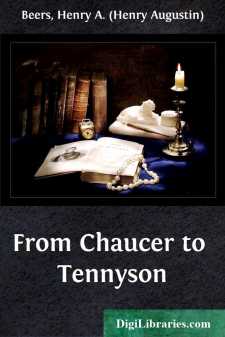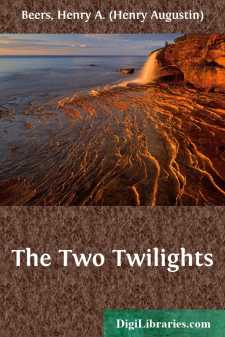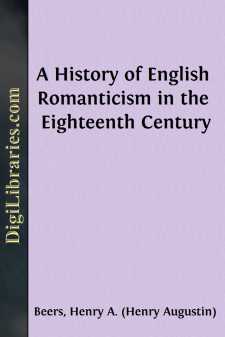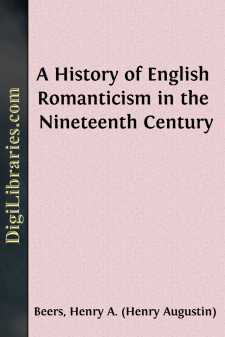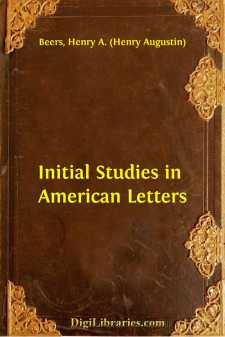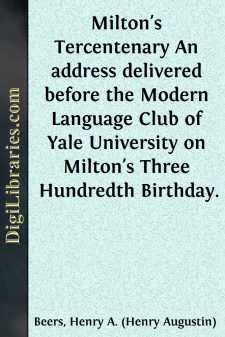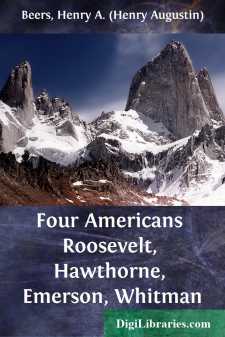Categories
- Antiques & Collectibles 13
- Architecture 36
- Art 48
- Bibles 22
- Biography & Autobiography 813
- Body, Mind & Spirit 142
- Business & Economics 28
- Children's Books 17
- Children's Fiction 14
- Computers 4
- Cooking 94
- Crafts & Hobbies 4
- Drama 346
- Education 46
- Family & Relationships 57
- Fiction 11829
- Games 19
- Gardening 17
- Health & Fitness 34
- History 1377
- House & Home 1
- Humor 147
- Juvenile Fiction 1873
- Juvenile Nonfiction 202
- Language Arts & Disciplines 88
- Law 16
- Literary Collections 686
- Literary Criticism 179
- Mathematics 13
- Medical 41
- Music 40
- Nature 179
- Non-Classifiable 1768
- Performing Arts 7
- Periodicals 1453
- Philosophy 64
- Photography 2
- Poetry 896
- Political Science 203
- Psychology 42
- Reference 154
- Religion 513
- Science 126
- Self-Help 84
- Social Science 81
- Sports & Recreation 34
- Study Aids 3
- Technology & Engineering 59
- Transportation 23
- Travel 463
- True Crime 29
Henry A. (Henry Augustin) Beers
Henry Augustin Beers (1847-1926) was an American literary historian, poet, and professor at Yale University. He is renowned for his works on American and English literature, particularly his books "A History of English Romanticism in the Nineteenth Century" and "A History of English Romanticism in the Eighteenth Century." Beers' scholarly contributions were instrumental in shaping the study of Romanticism and literary criticism during his time.
Author's Books:
Sort by:
The conscious water saw its Lord and blushed. Abraham Cowley is now less remembered for his poetry than for his pleasant volume of essays, published after the Restoration; but he was thought in his own time a better poet than Milton. His collection of love songs—the Mistress—is a mass of cold conceits, in the metaphysical manner; but his elegies on Crashaw and Harvey have much dignity and natural...
more...
THE TWO TWILIGHTS THE THANKLESS MUSE The muses ring my bell and run away.I spy you, rogues, behind the evergreen:You, wild Thalia, romper in the hay;And you, Terpsichore, you long-legged quean.When I was young you used to come and stay,But, now that I grow older, 'tis well seenWhat tricks ye put upon me. Well-a-day!How many a summer evening have ye beenSitting about my door-step, fain to singAnd...
more...
CHAPTER I. The Subject Defined To attempt at the outset a rigid definition of the word romanticism would be to anticipate the substance of this volume. To furnish an answer to the question—What is, or was, romanticism? or, at least, What is, or was English romanticism?—is one of my main purposes herein, and the reader will be invited to examine a good many literary documents, and to do a certain...
more...
CHAPTER I. Walter Scott.[1] It was reserved for Walter Scott, "the Ariosto of the North," "the historiographer royal of feudalism," to accomplish the task which his eighteenth-century forerunners had essayed in vain. He possessed the true enchanter's wand, the historic imagination. With this in his hand, he raised the dead past to life, made it once more conceivable, made it even...
more...
CHAPTER I. THE COLONIAL PERIOD. 1607-1765. The writings of our colonial era have a much greater importance as history than as literature. It would be unfair to judge of the intellectual vigor of the English colonists in America by the books that they wrote; those "stern men with empires in their brains" had more pressing work to do than the making of books. The first settlers, indeed, were...
more...
MILTON'S TERCENTENARY It is right that this anniversary should be kept in all English-speaking lands. Milton is as far away from us in time as Dante was from him; destructive criticism has been busy with his great poem; formidable rivals of his fame have arisenâDryden and Pope, Wordsworth and Byron, Tennyson and Browning, not to speak of lesser namesâpoets whom we read perhaps oftener...
more...
ROOSEVELT AS MAN OF LETTERS In a club corner, just after Roosevelt's death, the question was asked whether his memory would not fade away, when the living man, with his vivid personality, had gone. But no: that personality had stamped itself too deeply on the mind of his generation to be forgotten. Too many observers have recorded their impressions; and already a dozen biographies and memoirs have...
more...


